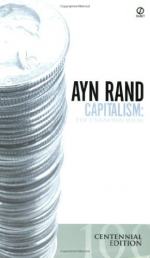
|
| Name: _________________________ | Period: ___________________ |
This test consists of 15 multiple choice questions and 5 short answer questions.
Multiple Choice Questions
1. What does the author believe is the basis for a mixed economy?
(a) Regulation.
(b) Individuals.
(c) Compromise.
(d) Businesses.
2. According to the author, many less-developed countries feel ______ by capitalism.
(a) Neglected.
(b) Threatened.
(c) Harassed.
(d) Pleased.
3. In response to the claim that the superiority of communism is scientifically proven, the American answer is that the U.S. system is based on what?
(a) Faith in God.
(b) Belief in mankind.
(c) Faith in society.
(d) The rise of the individual.
4. The author believes that Louis XIV creates a welfare state and ruins what?
(a) The international market.
(b) The domestic product.
(c) The international trade of silk.
(d) The domestic economy.
5. What is the form of government that prevails in most of Latin America?
(a) Statism.
(b) Fascism.
(c) Republicanism.
(d) Communism.
6. Who are the second scapegoats in a statist society, according to the author?
(a) Doctors.
(b) Thinkers.
(c) Politicians.
(d) Professors.
7. The author believes that the basis of American freedom is that man can act how?
(a) Altruistically.
(b) Selfishly.
(c) In his own self-intrest.
(d) For the betterment of all.
8. Who visits the United States and declares that the superiority of communism is scientifically proven?
(a) Vonderenko.
(b) Putin.
(c) Khrushchev.
(d) Gorbachev.
9. Governor Romney says we do not have a system of capitalism but of what?
(a) Retaliation.
(b) Protectionism.
(c) Regulation.
(d) Consumerism.
10. The author believes that society today is headed toward what?
(a) Totalitarianism.
(b) Guild socialism.
(c) Fascism.
(d) Dictatorship.
11. For the author, the Cold War is a type of what warfare?
(a) Meaningless warfare.
(b) Gang warfare.
(c) Scientific warfare.
(d) Peaceful warfare.
12. What does "laissez-nous faire" mean in English?
(a) Don't meddle with us.
(b) Leave us alone.
(c) Help us succeed.
(d) Leave us with ourselves.
13. When is the period of McCarthyism?
(a) 1940s-50s.
(b) 1930s-40s.
(c) 1920s-30s.
(d) 1910s-1920s.
14. How do irrational entities benefit from the United Nations, according to the author?
(a) By being dominant of rational entities.
(b) By being subservant to rational entities.
(c) By being associated with rational entities.
(d) By being influenced by rational entities.
15. What does the author believe determines the course of history?
(a) Man's self-sacrifice.
(b) Man's ideas.
(c) Man's mistakes.
(d) Man's work.
Short Answer Questions
1. Who wins the protest at Berkeley in 1964 over a strip of land?
2. What does the John Birch Society call Eisenhower?
3. When there is a conflict among groups that do not have the same principles, which does the author predict will win?
4. Sometimes legislators are open to _______, a fact which bewilders the public.
5. When government sets the objectives to be obtained, then it becomes what type of state?
|
This section contains 438 words (approx. 2 pages at 300 words per page) |

|




